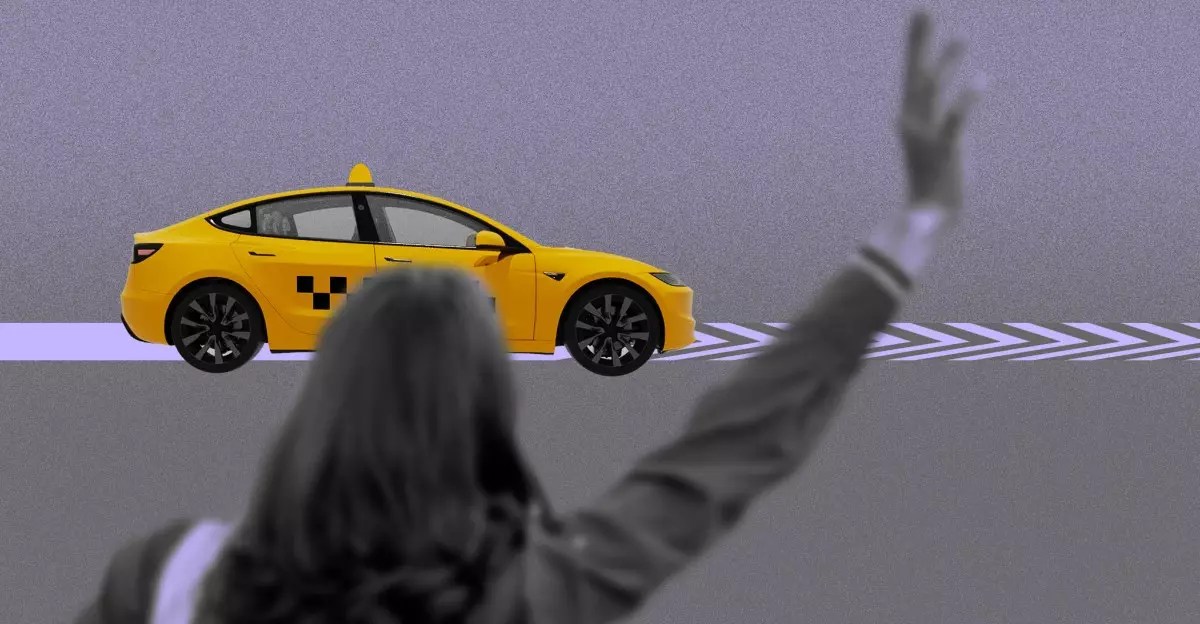When discussing the launch of Tesla’s new robotaxis, it’s clear that the company isn’t just operating within the bounds of typical product launches; it’s crafting a narrative that prioritizes loyalty over transparency. The spectacle surrounding the event, held in Austin, Texas, feels less like a technology showcase and more like an orchestrated performance for a carefully curated audience. A slew of Tesla influencers and fervent supporters filled the airwaves while established journalists were deemed unwelcome. This systemic exclusion speaks volumes about Tesla’s current media strategy, which appears to tie directly into Elon Musk’s ongoing war with conventional journalism.
Elon Musk has long positioned himself against traditional media narratives, often asserting that journalists misrepresent his vision. Unfortunately, this has cultivated an environment where critical inquiry is not only discouraged but also mocked. The apparent disdain for journalists seeking genuine engagement during the robotaxi launch underscores Musk’s vision of controlling the narrative, a vision eagerly adopted by his loyal fans. This dynamic creates a troubling feedback loop where dissenting voices are actively silenced in favor of feel-good stories that bolster the Tesla brand.
Redefining Media: The Rise of Corporate Propaganda
The true twist in this saga is the reinvention of the media landscape that Tesla is sponsoring. A phrase that reverberated throughout various discussions surrounding the robotaxi launch was, “We are the media now.” This shift indicates a burgeoning segment of alternative media that claims accountability and authenticity, while, paradoxically, indulging in the same exclusivity they criticize in traditional outlets. Influencers like Kim Java, who boast massive online followings, consciously choose to “control their own narrative,” opting out of traditional media appearances in favor of promoting through their channels.
These influencers find themselves in a paradoxical position where they benefit from a closed-loop system of promotion. The influencer-driven coverage of the robotaxi rollout constitutes a textbook case of corporate propaganda, molded precisely to restore and enhance Tesla’s reputation in a climate increasingly wary of its operational transparency. Other voices, such as Joan Donovan and Ed Niedermeyer, highlight the “echo chamber effect” that emerges when traditional media watchdogs are disregarded, warning that this is not a genuine grassroots movement but rather a carefully architected apparatus designed to further Musk’s vision.
Social Media and the Propagation of Tesla Narratives
The feedback dynamics present on platforms like X (formerly Twitter) and YouTube demonstrate how narrative-building can spiral into self-affirming cycles. Influencers have become the mouthpieces for a corporate agenda, fueled by a fervent fan base that actively rejects criticism as “propaganda.” On Reddit, for instance, community discussions reveal concerns about a flood of Tesla “apologist propaganda and disinformation” saturating forums that should, ideally, promote balanced conversations regarding autonomous technology.
Some Reddit users have gone so far as to suggest that Tesla employees lurk in these discussions, moderating content to preserve a favorable image of the company while stifling negative sentiment. Such claims pull back the curtain on the strategic approach Tesla employs in manipulating media narratives to its advantage while thrusting critical discourse into the shadows, if not outright erasing it from the public dialogue.
The Dangers of an Echo Chamber
While it is true that Tesla garners immense enthusiasm from its base, there comes a point of diminishing returns. The tough question looms: how long can a company thrive amidst an isolated fanbase that actively attempts to validate the brand? This heady mix of loyalty, financial incentives, and social standing amplifies the challenges associated with accountability. Loyal supporters, many of whom are invested in Tesla’s stock, are not merely consumers; they are stakeholders driven by the fear that critical discourse could negatively impact corporate performance.
As witty memes and fervent Twitter threads glorifying the latest Tesla product takeover the digital landscape, it becomes increasingly difficult to disentangle genuine consumer interest from orchestrated loyalty. While Tesla’s commitment to innovation deserves commendation, there is an innate danger in relying exclusively on a subset of voices that echo back only the favorable aspects of the narrative. An ecosystem dominated by sycophants ultimately risks faltering in the face of honest, critical examination when things go wrong.
In the grand scheme, to fully realize Elon Musk’s ambitious dream of millions of robotaxis dominating urban landscapes, Tesla must eventually confront the necessity for broader public engagement. This extended engagement should include the critics whom they’ve largely sidelined, disentangling the web of insular propaganda from genuine innovation and accountability. The challenge lies in balancing unabashed enthusiasm for revolutionary technology with the sobering realities and concerns that accompany such progress.


Leave a Reply